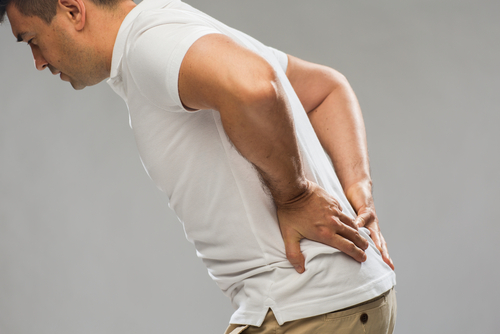Are you one of the millions in this country that suffers from joint pain and stiffness? If so, you know firsthand how debilitating joint pain can be and that it negatively impacts your quality of life. Vitamin K2 has shown to be very promising in getting at the root cause of joint pain.
What is Vitamin K2?
Before we start – you may be thinking vitamin K is potassium. It’s not. K is simply the symbol given to potassium on the periodic table.
Vitamin K plays a big role in blood clotting. But this form of vitamin K is called vitamin K1, or phylloquinone. Vitamin K1 is found in many plant foods, especially leafy green veggies.
But there is another form of vitamin K called K2, or menaquinone. While K1 is produced by plants, K2 is synthesized by bacteria in the large intestine of people and animals. Vitamin K2 plays many important roles in the body because it acts as a calcium regulator. This leads to not only a healthier heart, but healthier bones, teeth and joints.
What does it mean to be a calcium regulator? Vitamin K2 is a bit like an air traffic controller. But instead of telling airplanes where to go, it tells calcium where to go.
Why is this important?
Well, calcium is necessary to make your bones and teeth nice and strong. But if you don’t have enough K2, the calcium doesn’t know where to “come in for a landing” and so it lands anywhere and everywhere. This means it lands in your soft tissues, like the lining of your arteries, in your liver and kidneys, and in your joints!
Most Americans are Deficient in Vitamin K2
According to Dr. Kate Rheaume-Bleue, author of “Vitamin K2 and the Calcium Paradox,” roughly 80% of Americans are not getting enough K2. The result is an increasing group of people experiencing bone and joint problems as well as heart disease because the calcium is not being directed to the proper locations.
According to Dr. Rheaume-Bleue:
“While millions of people take calcium and Vitamin D supplements thinking they’re helping their bones, the truth is, without the addition of Vitamin K2, such a health regimen could prove dangerous. Without Vitamin K2, the body cannot direct calcium to the bones where it’s needed; instead, the calcium resides in soft tissue (like the arteries)–leading to a combination of osteoporosis and atherosclerosis, or the dreaded “calcium paradox.””
So, beyond helping your heart health, vitamin K2 can help get and keep the calcium from depositing in your joints and put that calcium in your bones and teeth. Talk about a win/win!
But that’s not the only way vitamin K2 can help stiff and painful joints…
Vitamin K2 Fights Inflammation
One of the biggest findings in recent years regarding the benefit of vitamin K2 is its role in fighting inflammation throughout the body. And as you know from reading this blog, inflammation is the root cause of many chronic diseases including heart disease, diabetes, arthritis and cancer.
Recent research presented at the 13th International Nutrition and Diagnostics Conference suggests that vitamin K2 as MK-7 “prevents inflammation by inhibiting pro-inflammatory markers produced by white blood cells (monocytes).”
The researchers from this study underscored the finding’s potential importance for health:
“Cardiovascular disease and osteoporosis are major age-related health conditions characterized by chronic inflammation. The nutritional insufficiency of vitamin K2, particularly menaquinone-7, emerges as one of the underlying causes of progressive deterioration of cardiovascular and bone health.
Our study may provide an additional explanation on the role of inflammation and preventing inflammation with vitamin K2 as an important mechanism of this re-emerging vitamin in sustaining health and preventing disease.
… We know that in Western populations, most people do not obtain enough due to modern diet. Our food is increasingly deficient in vitamin K2 in particular, and up to 98% of the general healthy population may be vitamin K2 insufficient with long-term detrimental impact on bone and cardiovascular health.”
How to Get More Vitamin K2 into Your Diet
Chances are, you are one of the millions of people who are not getting enough K2. Since a majority of people have compromised gut health, natural K2 synthesizing cannot occur.
Beyond getting your gut health in check, there are certain foods you can eat that are rich in vitamin K2. Those include grass-fed meat, grass-fed cheese and butter, and free-range eggs.
Your doctor may also decide you would benefit from higher doses of K2, in which case you may also want to consider adding a K2 supplement to your diet.
If you are suffering from joint pain and stiffness, chances are good that vitamin K2 can help fight inflammation and remove the calcium deposits from your crackling joints and get it back into your bones and teeth where it belongs.
This is just one way you may find relief for your joint pain and stiffness. Would you like to learn how one doctor cured himself of joint pain naturally and FOR GOOD? Then pick up your copy of The Joint Pain Solution today and get your life and health back.
 Validating...
Validating... 





2 Comments